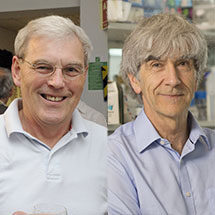
The International Union of Crystallography (IUCr) Gjønnes Medal in Electron Crystallography has been awarded to Richard Henderson, Group Leader in the LMB’s Structural Studies Division, and Nigel Unwin, LMB Emeritus Group Leader from the LMB’s Neurobiology Division, “for their development and powerful application of structural determination methods for biological complexes at near-atomic resolution using electron crystallography”.
The work of Richard and Nigel has been instrumental in the development of electron microscopy as a mainstream structural biology tool. Richard and Nigel began working together at the LMB in the 1970’s to develop electron microscopy into a tool that could be used to determine the native structure of proteins, in particular the structure of membrane proteins. Previous attempts to generate 3D crystals of membrane proteins, required for the established structural determination technique of X-ray crystallography, had failed, but 2D crystals of membrane proteins could be produced, and these were suitable for electron microscopy. They successfully determined the first structure of the membrane protein bacteriorhodopsin using electron microscopy in 1975. Further technical developments enabled Richard to obtain the first atomic structure of bacteriorhodopsin in 1990, and Nigel published the near-atomic structure of a different membrane protein, the acetylcholine receptor, in 2005. Improvements in electron microscopes, the development of better detectors and more powerful computational methods by many contributors have allowed electron cryo-microscopy to become a high-resolution method for structural determination.
The Gjønnes Medal in Electron Crystallography is awarded every 3 years and recognises an outstanding contribution to the field of electron crystallography. The award is named in honour of its first recipient, Professor Jon Gjønnes of the University of Oslo, who received the award in August 2008. Nomination for the Gjønnes Medal is open to scientists and engineers in all areas of electron crystallography, defined in the broadest context as the branch of science that uses electron scattering and imaging to study the structure of matter. Richard and Nigel are the first biological scientists to receive the Gjønnes Medal, with the three previous awards made to researchers in the physical sciences.
Richard and Nigel received their award during the IUCr 2017 Congress in Hyderabad in August, where they shared the presentation of a Keynote Lecture.
Further references:
Richard’s group page
Nigel’s group page
International Union of Crystallography
Video – Looking at Molecules: The electron cryo-microscopy revolution at The MRC LMB